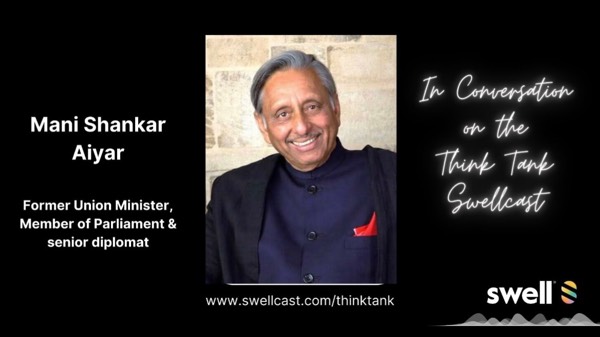
@ThinkTank · 1:43
Future of Democracy; Reflections and Observations on India and the World
So the moment we've all been waiting for is finally here. This is Karan Dave and I'm joined today by one of India's foremost intellectuals, public figures, and he's also an overall PolyMAT. He has closely witnessed India's democracy transition over several decades. He needs no introduction, but for some of our listeners from across the world who might not be familiar, manishankar Ayer is a former veteran member of Parliament
Mani Shankar Aiyar
@MSA · 3:23
You. Oh, there we go. Now it's come. I think you've raised the single most important question of concern regarding the future of our democracy. I have just been reading a very interesting book by a professor at the University of Virginia here called Nithi Nayer. The book is called Hurt Sentiments and she quotes extensively from the debates of the Constituent Assembly and subsequently Parliament all the way from 1947 till the present

@ThinkTank · 1:42
So whilst the Congress and several opposition parties criticized the government for certain scandals with big business groups, especially over the last year, the government alleges that crony capitalism was the hallmark of the UPA years. And the tendency to enable monopolies and provide disproportionate access to resources to a few corporations began with the and, you know, it began with the Congress, and it finds its inception with the UPA years
Mani Shankar Aiyar
@MSA · 3:24
But the sense of being poor comes from lived experience and the lived experience of most Indians ever since economic reforms but most acutely since the state declared itself officially as the champion of crony capitalism has grown enormously in the last eight years and is beginning to affect the electoral prospects of the Modi government

@ThinkTank · 1:03
Speaking of issues which could potentially affect elections, mr the Modi government has had various approaches to foreign policy. On the one hand, it seems that India is being a bit more belligerent with our neighbors and a bit more reactive. But on the other hand, many people have voiced concern about the state of the border with China specifically. So do you have any insights or observations on our current relationship with China and the border issues?
Mani Shankar Aiyar
@MSA · 5:00
We are now back almost to the degree of hostility that existed on the eve of the 1962 war. So I would regard his China policy as being extremely confused. And if news about this, as you say, is trickling down in a confused manner, it's only because the Prime Minister refuses to expose himself to the press. The one time that he actually made a statement to the press, he denied that any inch of Indian territory was under Chinese occupation
Mani Shankar Aiyar
@MSA · 1:08
Let me hold it. Standard past practice of which modi disapproved. He not only canceled the talk at Foreign Secretary level, but also dismissed the Indian Foreign Secretary, Sujata Singh, and never resumed the conversation. Although he did make a token visit to Rywind near Lahore, to bless the Prime Minister's granddaughter, who was getting married shortly thereafter. But that was an empty gesture. Year and now our relationship with Pakistan has been completely barren for the last eight years and more

@ThinkTank · 1:23
So, just to conclude this conversation, Mr Ire, I'd like to club two questions together. There's been a lot of interest in the run up to this interview and we've had questions pouring in from a lot of users. And for now, I'm just going to shortlist one question from Glenn Mann, who's from New York City, and he was wondering what you made of the strength of liberal democracy in the United States and in the UK. What is your assessment?
Mani Shankar Aiyar
@MSA · 5:00
For only a united opposition can ensure that the two thirds of the Indian electorate which voted against the BJP even in 2019, let alone 2014, is the true majority here. But the BJP has succeeded in capturing two thirds of the seats with only one third of the vote
Mani Shankar Aiyar
@MSA · 0:22
That if there is a measure of opposition unity, then to the extent to which the index of opportunity of opposition unity is increased, to that extent, the BJP's prospects are decreased. Thank you, Jhin
